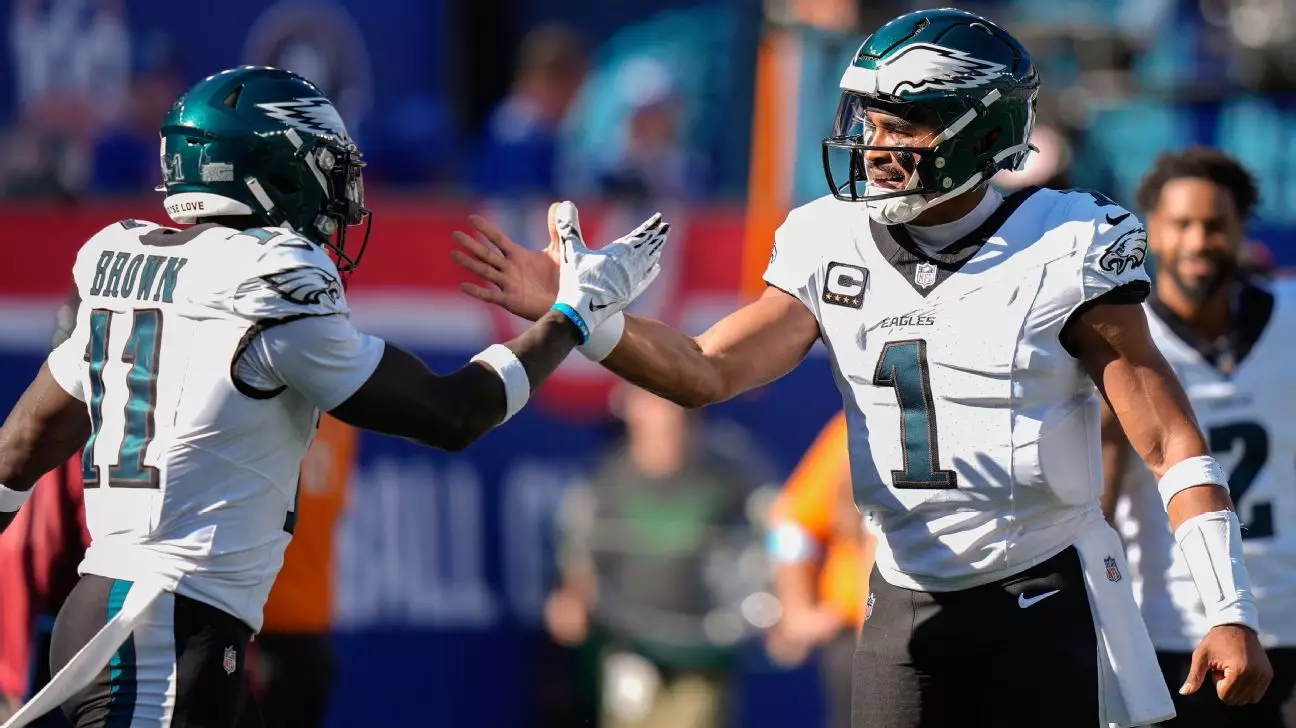The Philadelphia Eagles, currently enjoying a successful season with an 11-2 record, have recently found themselves under the media microscope due to comments about the relationship between quarterback Jalen Hurts and receiver A.J. Brown. Speculation surrounding their dynamic intensified after teammate Brandon Graham’s remarks insinuated tension between the two. However, both players have rebuffed these claims, emphasizing the strength of their bond and the necessity of teamwork.
This situation serves as a lens through which we can examine the complex interplay between personal relationships and on-field performance in professional sports. With the Eagles on an 11-game winning streak, the focus ideally would remain on their success. Instead, external perceptions are threatening to overshadow the team’s achievements, sparking discussions about individual performances and interpersonal dynamics.
After the Eagles’ recent match against the Carolina Panthers, where they clinched their ninth consecutive win, Hurts delivered a modest performance—14 completions on 21 attempts, yielding just 108 yards and two touchdowns. This underwhelming passing attack raised questions, particularly as Brown expressed frustration over his lack of targets until late in the game. This frustration manifested physically when he slammed his helmet after a three-and-out, a moment that captured the attention of pundits and fans alike.
Brown subsequently criticized the Eagles’ passing attack with a simple, assertive, “Passing,” when asked where improvements were necessary. This statement was interpreted by some, including Graham, as a jab at Hurts. The interpretation of such statements highlights how pressure can push athletes into a position where their emotional responses are scrutinized and perhaps misinterpreted by outsiders.
Graham’s comments during his radio show added fuel to the fire, suggesting a rift between Hurts and Brown, stating, “They were friends before this, but things have changed.” This commentary ignited a flurry of media speculation about the duo’s relationship and their ability to function as a unit on the field. However, both Hurts and Brown quickly addressed these claims, emphasizing that their relationship remains intact and personal.
Brown stated, “Me and Jalen’s relationship is personal,” and he expressed regret at how his critique of the passing game was perceived by outsiders. It’s a stark reminder of how easily public interpretations can diverge from the true narrative within a team. Moreover, the very nature of team sports mandates close relationships; the pressure to perform can cause friction, but it also fosters resilience and unity when navigating challenges.
Coach Nick Sirianni has taken a hands-on approach in addressing this episode. His decision to discuss the situation during a team meeting underscores the importance of maintaining cohesion and open lines of communication within the squad. In professional sports, every player’s voice can influence the team’s environment. Harmony is vital for consistent performance, and it’s evident that the Eagles are working diligently to maintain a collegial atmosphere, pivotal for their postseason aspirations.
The Eagles’ strategic shift towards a more run-heavy offense, emphasizing the talents of running back Saquon Barkley, has paid dividends. Although the team ranks at the bottom of the league for passing, their remarkable performance on the ground and their solid standings reflect that adaptability in strategy can mitigate individual player concerns, providing a broader context for success.
As the Eagles prepare for their upcoming clash with the Pittsburgh Steelers, the emphasis will have to be on overcoming distractions and focusing on performance. Tackle Jordan Mailata aptly stated, “It’s the Pittsburgh Steelers this week, not the A.J. Brown and Jalen show.” This shift in focus away from interpersonal drama toward game preparation is critical, as it reflects the maturity of the team to prioritize collective goals over individual narratives.
While the Eagles continue to strive for excellence on the field, it remains crucial for Hurts and Brown to navigate the narrative surrounding their relationship effectively. Acknowledging that performance pressures can lead to misunderstandings is important, but ultimately, it is the team’s resilience and focus on winning that will dictate their success. Making the necessary adjustments while maintaining robust interpersonal relationships may be the key to their continued dominance in the NFL.

